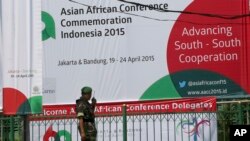The week-long Asia-Africa Conference 60th anniversary commemoration opened Sunday in Jakarta with representatives from 77 countries in attendance and over 30 heads of states expected to participate. The Indonesian organizers see this conference as means to increase development and cooperation programs between developing countries.
The first Asia-Africa Conference was held in Bandung, Indonesia in 1955 to advocate for liberation from colonial rule and resist undo influence from the two major superpowers: the United States and the Soviet Union.
At the 60th anniversary commemoration in Jakarta and Bandung, Indonesian Foreign Ministry spokesman Arrmanatha Nasir said the focus this time was different.
“I think the major theme is development. It’s ensuring that the people of Asia and Africa have a growth away from poverty and reducing the development gap between Asia and Africa,” he said.
The original Asia-Africa Conference led to the founding of the Non-Aligned Movement. With the end of the cold war some analysts questioned the multi-national organization’s relevance. Its meetings often produced anti-Western rhetoric but no cooperative programs.
This year Indonesian President Joko Widodo wants to give developing nations a new framework based on cooperation and development. During the conference the Indonesian organizers will promote increasing South-South cooperation; a term that means direct cooperation among developing countries and Triangular cooperation that involves developing countries working alongside advanced Western countries to provide assistance.
Dian Triansyah Djani, a high ranking official in Indonesia’s Foreign Ministry, highlighted how his country, with funding and support from Norway, was providing 45 assistance programs to Afghanistan in the fields of health, education and agriculture, among others. He said no one country could do it alone.
“The needs are quite vast and the programs that we are expected to be undertaking are so large that a country like Indonesia will not be sufficient, or any developing country would not be sufficient enough, to not also cooperate with other colleagues from the developed countries,” he said.
Norway’s Ambassador to Jakarta Stig Traavik said countries in the Islamic world could more easily relate to Indonesia’s experience in development and democracy as the world's largest Muslim majority country.
“Indonesia is a superpower in one area and that is in pragmatism, tolerance and moderation,” said Traavik.
Organizers say they also want to increase the power and influence of developing countries in the United Nations, although China, France, Russia, Britain and the United States hold veto power as permanent members of the Security Council.
Later in the week, the heads of state from China, Japan, South Africa, Ethiopia and Pakistan are scheduled to address the conference.





